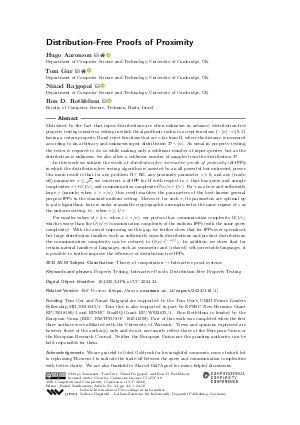LIPIcs.CCC.2024.24.pdf
- Filesize: 1.01 MB
- 18 pages

 Creative Commons Attribution 4.0 International license
Creative Commons Attribution 4.0 International license

Motivated by the fact that input distributions are often unknown in advance, distribution-free property testing considers a setting in which the algorithmic task is to accept functions f: [n] → {0,1} having a certain property Π and reject functions that are ε-far from Π, where the distance is measured according to an arbitrary and unknown input distribution 𝒟 ∼ [n]. As usual in property testing, the tester is required to do so while making only a sublinear number of input queries, but as the distribution is unknown, we also allow a sublinear number of samples from the distribution 𝒟.
In this work we initiate the study of distribution-free interactive proofs of proximity (df-IPPs) in which the distribution-free testing algorithm is assisted by an all powerful but untrusted prover. Our main result is that for any problem Π ∈ NC, any proximity parameter ε > 0, and any (trade-off) parameter τ ≤ √n, we construct a df-IPP for Π with respect to ε, that has query and sample complexities τ+O(1/ε), and communication complexity Õ(n/τ + 1/ε). For τ as above and sufficiently large ε (namely, when ε > τ/n), this result matches the parameters of the best-known general purpose IPPs in the standard uniform setting. Moreover, for such τ, its parameters are optimal up to poly-logarithmic factors under reasonable cryptographic assumptions for the same regime of ε as the uniform setting, i.e., when ε ≥ 1/τ.
For smaller values of ε (i.e., when ε < τ/n), our protocol has communication complexity Ω(1/ε), which is worse than the Õ(n/τ) communication complexity of the uniform IPPs (with the same query complexity). With the aim of improving on this gap, we further show that for IPPs over specialised, but large distribution families, such as sufficiently smooth distributions and product distributions, the communication complexity can be reduced to Õ(n/τ^{1-o(1)}). In addition, we show that for certain natural families of languages, such as symmetric and (relaxed) self-correctable languages, it is possible to further improve the efficiency of distribution-free IPPs.

























Feedback for Dagstuhl Publishing